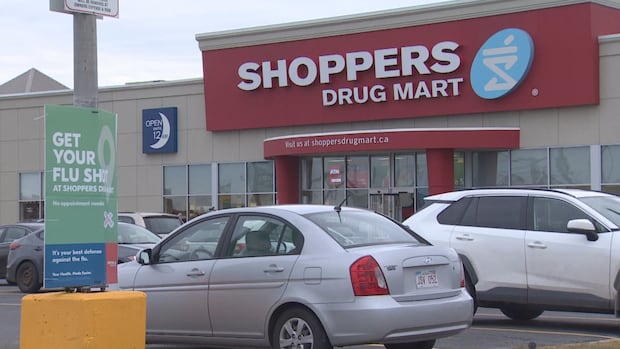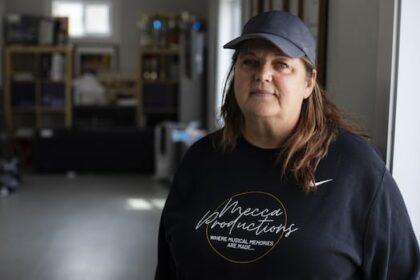Blaine Higgs had a problem. Canada’s largest pharmacy chain had a solution.In the summer of 2022, Higgs, New Brunswick’s Progressive Conservative premier, made sweeping changes to the senior management of the province’s health care system, vowing to find new ways to improve access.By the end of the year, Perry Martin, a senior lobbyist for Shoppers Drug Mart, was nudging the provincial Department of Health to move quickly on a pilot program the company said would help.When a Health Department official didn’t provide Martin a clear timeline, he forwarded the email to Higgs’s chief of staff, Louis Leger.”Doesn’t look like we can hit the Premier’s timelines for an announcement at this point,” Martin, the vice-president of government relations for Loblaws, the owner of Shoppers, wrote in a Dec. 14, 2022, email obtained by CBC News.Higgs wanted an announcement in January 2023 and the program up and running in February, documents show.The idea was that letting pharmacists manage and prescribe for chronic conditions such as diabetes and asthma, and do swab tests for strep A infections, would take pressure off family doctors and emergency departments.Patients who didn’t have a doctor, or who couldn’t get in to see their doctors promptly, would have a convenient new option.The government didn’t meet the premier’s timeline, but it eventually launched the pilot project in six New Brunswick pharmacies.Earlier this year, it was shut down by the new Liberal government of Susan Holt.The seemingly simple calculus — that every patient getting care at a pharmacy would take pressure off the public system — remained unproven, officials said in internal emails this year.Perry Martin, a senior lobbyist for Shoppers Drug Mart, had suggested New Brunswick adopt a similar system to what existed in Alberta. (Zoom)What the pilot showed, according to more than 900 pages of documents obtained through a right-to-information request, was that improving access wasn’t simple at all, and that the government was warned about pitfalls at the very beginning.Martin was registered as a lobbyist in New Brunswick “to promote the funding and expansion of pharmacists’ professional services,” according to his public filing.Shoppers had launched a pilot in Lethbridge, Alta., that he pitched to Leger in late 2022 for the company’s location on Prospect Street in Fredericton.”He became quite excited by that, and it just so happened the premier was in his office, so I went in and spoke briefly there,” Martin recalled in an interview.”That kind of sparked an interest, and it grew from there.”Martin suggested New Brunswick do like Alberta and give pharmacists in the pilot the authority to order blood work in hospital testing labs for the conditions, such as diabetes, covered in the program.In Alberta, pharmacists were allowed to bill Medicare for those requisitions.New Brunswick said no — for the time being.Former health minister Bruce Fitch announced the pilot program at a pharmacy in Fredericton in 2023. (Jonathan Collicott/CBC)Penny Higdon, the director of primary care, suggested in an email they proceed with the start of the pilot “until such time labs are enabled.”She acknowledged that if pharmacists had to send patients to doctors for their tests, “this would defeat the purpose” of the pilot.Martin said it was disappointing the province never allowed pharmacists to order blood work. Without it, patients “still have to go back to their doctor, right? So you’re not really solving as much as you could,” he told CBC News.Anastasia Shiamptanis, the registrar of the New Brunswick College of Pharmacists — the profession’s self-regulating body — also wanted this change, according to an April 2023 email.Current Liberal Health Minister John Dornan said the department worried that additional requisitions from pharmacists for blood work would put more pressure on the existing heavy load in provincial labs.Despite the disagreement, the push to get the pilot project organized continued through the first half of 2023.”Politically, there is pressure to pilot such a clinic as a sign of trying something new and innovative,” Mélissa Boudreau, a health consultant at the department, wrote in a briefing note to Eric Beaulieu, the deputy minister, on June 29.In July, as the launch neared, Shiamptanis asked department staff for a meeting with Bruce Fitch, the health minister at the time, to try again on the issue of pharmacists ordering blood work.Beaulieu’s executive secretary told officials: “At the [deputy minister]’s request, please decline their invitation for a discussion.”Fitch announced the program on July 26, 2023, at the Shoppers Drug Mart location on Prospect Street in Fredericton.Anne Marie Picone, president of the New Brunswick Pharmacists’ Association, said pharmacists were no longer willing to absorb mounting overhead costs. (Chad Ingraham/CBC)The participating pharmacies would cover the cost of assessing and prescribing during the pilot, but patients, or their drug plans, would have to pay for any prescribed medications.”It’s our hope that this project will give us a new way to deliver primary care here in the province,” Fitch said, predicting it would free up doctors to deal with more serious conditions.He did not mention that his department was telling the pilot pharmacists to send patients to their doctors, or to N.B. Health Link, for blood work.N.B. Health Link was a new network of doctors’ offices operated by Medavie that sees patients who don’t have their own physician or nurse practitioner.One pharmacist reported that 80 per cent of patients using her pharmacy clinic needed blood work — and 60 per cent of them lacked a family doctor.Sending them to N.B. Health Link began putting more strain on a program that itself was designed to reduce strain on the system and improve access to care. The province’s doctors had concerns about the pilot, fearing “a lack of communication” between pharmacists and doctors seeing the same patients would create new silos, said Dr. Lise Babin, the president of the New Brunswick Medical Society.The society also had resisted the idea of pharmacists getting the power to order blood work.”If pharmacists ask for a test which was already asked [for] by the family physician or the nurse practitioner, the patient is getting the same test twice in an already overloaded system,” Babin said.WATCH | ‘A barrier to care’: Pilot project was troubled from the start:A prescription for confusion and frustrationWhy a primary care pilot program in N.B. pharmacies ran into trouble.In November 2023, the department rejected Shiamptanis’s latest argument — that pharmacists in a similar pilot in Nova Scotia could order lab work.The Nova Scotia change took a year, wrote Greg Sargent, the executive director of primary care, on Nov. 3, 2023, and in New Brunswick, it would require legislation.”There are many operational and capacity considerations to such a decision,” he said.”We are fragmenting care and putting patients at risk by not acting,” Shiamptanis responded. Patients, she said, were left using “double the number of health-care resources.”Then it got worse.In January 2024, a Moncton man died of invasive Group A strep, a bacterial infection spiking in the province at the time.His widow urged people to get tested if they had symptoms.”Don’t sit on it,” Kim Wetmore said in a media interview.Point-of-contact strep A tests, using swabs, were part of the pilot project at the six pharmacies, which were soon swamped by anxious New Brunswickers.”Our appointments are filling up as soon as we open them and we’re running through tests faster than we can get them in,” wrote Ashley Blouin, one of the participating pharmacists.In two of the province’s health zones, the Fredericton and Saint John areas, N.B. Health Link, facing capacity problems of its own, stopped taking referrals for blood work from pharmacists in the pilot.”This is yet another example of the need to allow these pharmacies the ability to request the lab work required,” wrote Anne Marie Picone, president of the New Brunswick Pharmacists’ Association.At the same time, the pilot pharmacists were being deluged with patients prescribed point-of-care tests by Maple, the private company operating the eVisit virtual care service.That created more duplication, because “the pharmacist cannot perform a test without providing their own assessment,” Picone wrote.Six months into the pharmacy pilot, three different programs created to simplify access to care for New Brunswickers were now overlapping and colliding with each other, creating confusion and frustration.The pilot was due to end in September 2024, but the province was willing to extend it so that University of New Brunswick researchers could complete an evaluation of its impact.Pharmacists, though, were no longer willing to absorb mounting overhead costs and demanded the province pay them fees.Picone argued fees were warranted because a similar program in Nova Scotia led to a 9.2 per cent drop in emergency visits for less urgent conditions.Health officials checked, however, and concluded the drop was because of a combination of several initiatives.Still, they reached a deal on fees in September, avoiding a scenario in which the pilot would have expired just as Higgs was about to call an election.Post-election, the new Liberal government had to decide whether to extend the pilot again in early 2025.In a Dec. 5, 2024, briefing note to Dornan, Mélissa Boudreau said the inability to order tests was “a major barrier” and without a change, the College of Pharmacists would not support an expansion.She also mentioned “growing concern about the influence of the pharmaceutical industry on health-care policy” — the first mention of that in the documents.She cited an Ontario report that surveyed pharmacists who complained of corporate pressure to hit quotas and revenue targets.The government confirmed on Jan. 23, 2025, that the pilot would end.The UNB evaluation report conducted for the pharmacists’ association found high patient satisfaction with the program.But a briefing note said there was “no significant change” for diabetes services, and while there was a decrease in outpatient visits, eVisit and Telecare calls for the covered conditions, there was “no significant change in emergency visits.”In a Feb. 10 email, Nicole Poirier, the director of primary care, pointed out the report contained “no conclusive findings” that it reduced pressure on the public system, and did not show better health outcomes for patients.Another report by the same UNB team, prepared for the department, has not been released yet.Pharmacists continue to provide other services, such as prescription renewals, that they’ve taken on in recent years, and Picone is hoping for a “thorough dialogue” with Dornan on other possibilities.She doesn’t believe the blood test disagreement killed the pilot but said the barrier prevented the project from running more smoothly and proving its worth.The opposition Progressive Conservatives criticized the cancellation when the legislature reconvened in March. MLA Bill Hogan called it “a disgrace.”Dornan responded that the Holt government was “shifting the pilot resources” to its collaborative care model.The concept would see primary care services, and in some cases pharmacists, working together to coordinate care in the same health centre.”When the pharmacist works together with a nurse practitioner and a physician, they get the whole spectrum of care and that’s what we are working towards,” Dornan said in question period on March 21.When Hogan mentioned that the Shoppers Drug Mart in Fredericton had spent money renovating the store to add a clinic, Dornan responded that “You know, it’s Big Pharma that has been pushing this, not so much the rank and file citizens of our province.” Martin, the Shoppers lobbyist, told CBC News that was “an unfortunate comment based on, probably, a gut reaction,” and in subsequent meetings, Dornan has shown he’s “strongly supportive” of pharmacists.”We’re not ‘Big Pharma,'” Martin said. “Maybe you could call this ‘Big Pharmacy,’ but we’re a team of health professionals. We’re not trying to push drugs.”Dornan said Monday he misspoke because of his “newness” as minister and he used the term “out of context.” Babin, from the medical society, said there are concerns that large pharmacy chains are in a position to profit from prescribing in a way doctors are not.”I realize they’re bound by the same ethical principles we are, but there’s a difference between the pharmacy and the pharmacist, and the pharmacy is obviously big business, and it does bring up that concern.” The minister said overall, the pilot project was valuable in showing what pharmacists can do, and it’s still possible they’ll get authority to order blood tests, particularly those who are part of collaborative care clinics.”It’s not a shut door,” he said.”We will continue to discuss this with the pharmacists as a very big group, a valuable part of our team, so it’s not over yet.”
‘Fragmenting care’: How a pilot project in N.B. pharmacies fell apart











